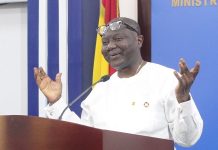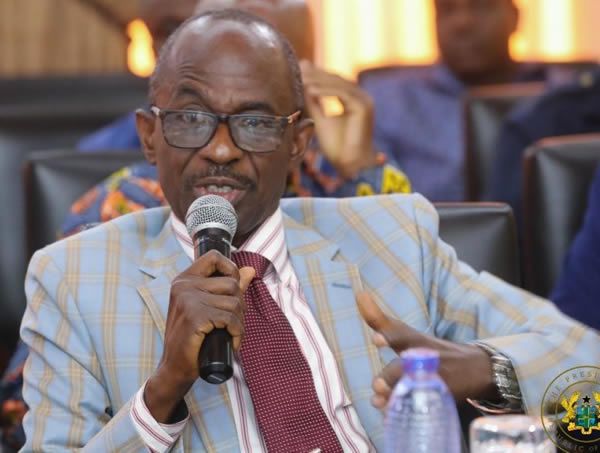The largest opposition party, the National Democratic Congress (NDC), has given the strongest indication yet that, it will likely contest the results of next year’s polls.
NDC General Secretary, Johnson Asiedu Nketiah, who served notice of the opposition party’s intentions, said their actions or inactions will largely be based on the conduct of the Chairperson of Electoral Commission (EC), Mrs. Jean Mensa.
To him, if the EC
chairperson’s conduct regarding the rules governing electoral process
remains unchanged, it will be difficult for the NDC to accept the
outcome of the election 2020 results.
Speaking on Okay FM’s Ade Akye Abia
Morning Show, the NDC Chief Scribe insisted the only basis upon which
the NDC can trust EC is through the strict application of the laws
governing the electoral process.
“ . . if she follows the application of the law mandated for the EC, there will be trust in the results of the 2020 elections.”
“But if she continues in this tangent without adhering to the law except the application of her will in the electoral process, then it will be another matter al-together. How can you trust that situation? . . . because the law has been put in place to ensure trust in the operations of the EC….
“...we have rules of selecting EC officials to monitor elections at the polling stations and all the political parties have a say in the selection of the officials, and so if she has selected her own people to undertake the limited registration exercise, by ignoring the rules of engagement regarding the organisation of the elections and registration exercises, then who will accept the result she will declare?” he quizzed.
Whiles conceding that the law allows the Electoral Commission (EC) to be independent, he however, pointed out that the Commission in its wisdom established Inter-Party Advisory Committee (IPAC) in order to build trust in the electoral process.
“The law allows the EC to do an independent work but why did the Commission established IPAC in the first place? It is because they want political parties to trust the electoral process in the country and for people to trust the EC, which is why IPAC was established,” he said.
The NDC General Secretary therefore warned of consequences to unilateral decisions by the Electoral Commission before, during and after the 2020 polls.
“So if she says she will not work with IPAC again but then she wants people to trust their activities, then it is up to her. She can decide to take any decision on the electoral processes at her whims and caprices by basing them on her constitutional mandate and if no-one understands those decisions, whatever we have to do to challenge the decision, we will do it. She can even announce the dissolution of IPAC since the constitution does not stop her, and then we will see,” he warned.

IPAC Background
Since the dispensation of the 1992 Constitution, political parties have formed the bedrock upon which Ghana’s democracy evolves. The role played by these political parties has contributed immensely to making Ghana the beacon of hope for the African continent.
There is no doubt that the role played by the Inter Party Advisory Committees (IPAC) has brought some cordiality and diplomacy among parties and catalyzed an indirect decision making process on our electoral process since its inception.
The concept of IPAC was conceived by the EC based on experiences gained from the 1992 General Elections. The EC came under intense criticism, especially from political parties in opposition, ranging from the electoral process or the conduct of the polls through to suspicion.
IPAC was
therefore formed in March 1994 to bring together representatives of the
political parties on a monthly basis with members of EC to discuss and
try to build a consensus on electoral issues.
Representatives
of the international donor community that have assisted the electoral
process are also invited to observe proceedings at IPAC meetings.
However, IPAC is not open to the general public or the media.
It
must be pointed out that IPAC is a non-statutory advisory body whose
decisions are not binding, however, the EC has over the years given
consideration to some decisions which were lawful, practical and cost
effective.
In view of the vital role IPAC plays in Ghana’s electoral system, the EC has decentralized the concept at the regional, district and constituency level and has been instrumental especially in the conduct of the 1996, 2000, 2004, 2008 and 2012 general elections.
Source: peacefmonline.com









































